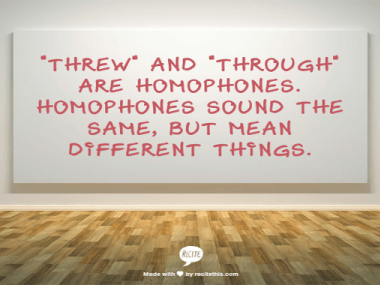‘Stationery’ Versus ‘Stationary’
“Stationary” comes from a Latin word that means “motionless.” The story of “stationery” is far more interesting.
One difficult set of words is “stationery” and “stationary.” They are pronounced the same, but mean different things. They’re homophones.
You can trace both words back to the Latin word “stationarius,” which meant “without motion,” and in Latin, it seems to have been used to describe a military station.
‘Stationary’
It’s easy to see how a Latin word that meant “motionless” gives us the English word “stationary,” which essentially means the same thing: “not moving, fixed in one place, still” and so on.
Almost every big gym has a row of stationary bikes.
You can remember the spelling of this word by thinking that when you are stationary, you are often standing. Since “standing” is also spelled with an A, the association can remind you to put the second A in “stationary.”
‘Stationery’
The story of how we get “stationery” is a little more interesting.
Buy Now

In the Middle Ages, many villages and towns got goods from traveling peddlers, but as anyone who’s packed too many books on vacation knows, books and other paper products are heavy, so booksellers and people who sold other paper products usually sold them from a storefront—a stationary location, as in a location that didn’t move, a station. Then these sellers became known as “stationers.” Then by association, the products they sold, the stationers’ wares, became known as “stationery” with an E after the name of the people who ran the shops—the stationers.
And as a delightful aside, the Oxford English Dictionary describes a livery company of the City of London formed in the 1400s called the Worshipful Company of Stationers, which was essentially a guild of stationers, and it still exists today, but it’s now called The Stationers’ Company.
The Oxford English Dictionary also says Stationer (at the time spelled Staciner) was a surname in the late 1200s. If your last name is Stationer, it probably means one of your ancestors was a bookseller, printer, or bookbinder.
“Stationery,” with an E, is paper, usually paper you use for writing letters or notes, and “stationery” is spelled with an E because it goes back to the stationers, the people who ran the shops. But if that doesn’t help you remember the proper spelling, here’s a simpler trick: You can remember that it’s spelled with an E by thinking that the E stands for “envelope.”
If you never write letters, you can think of the E as standing for email, which is still something you send, kind of like stationery.
Use the nice stationery to write to your grandmother.
‘Stationary’ Versus ‘Stationery’
Think of the “stationary” that describes standing still as being spelled with an A for “standing,” and the “stationery” that describes paper products as being spelled with an E for “envelope.”
Image courtesy of Shutterstock.
Related Article
“Complement” Versus “Compliment”
Mignon Fogarty is Grammar Girl and the founder of Quick and Dirty Tips. Check out her New York Times best-seller, “Grammar Girl’s Quick and Dirty Tips for Better Writing.”






